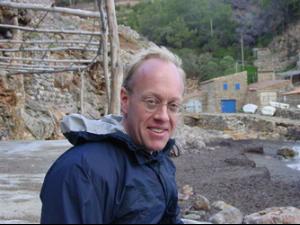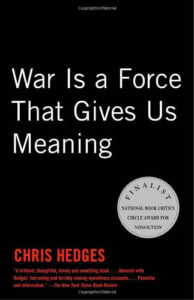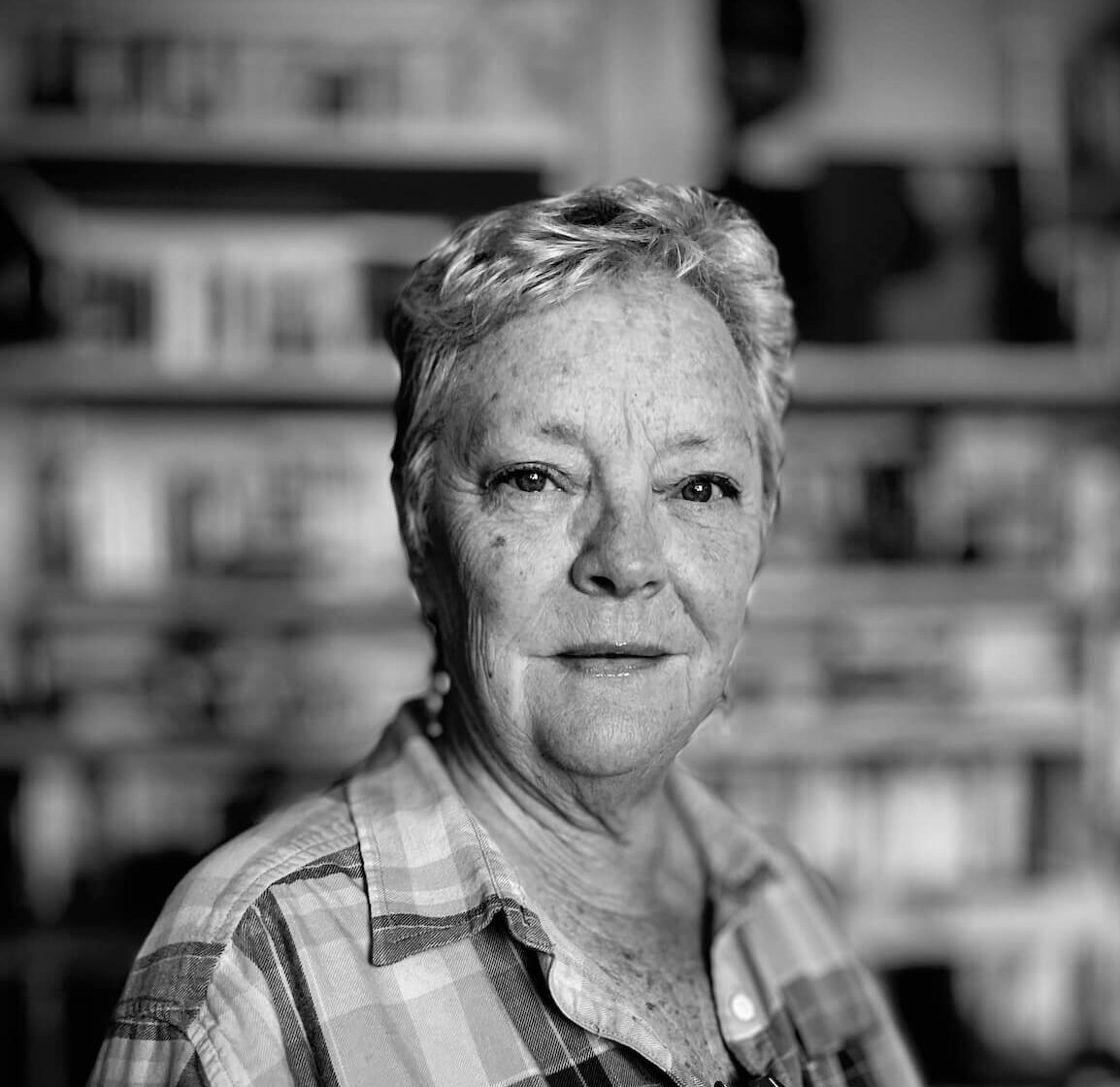‘Courage is contagious’
Author Chris Hedges, coming to Colorado this month, predicted current events in Washington in America: The Farewell Tour and lays out the requirements for a strong resistance
Author Chris Hedges, coming to Colorado this month, predicted current events in Washington in America: The Farewell Tour and lays out the requirements for a strong resistance
Chris Hedges is not an easy read. He identifies the issues that stifle, cripple and murder human progress, then digs deep to identify the root causes, always driving home the unavoidability of discomfort that comes with change. He’s a social critic, a prolific author, an ordained Presbyterian minister and a Pulitzer Prize-winning journalist who covered conflicts in Latin America, the Middle East, Africa and the Balkans. His book War is a Force That Gives Us Meaning (2002), a National Book

Chris Hedges
Critics Circle finalist, drew from those experiences. On April 25, Hedges willl be in Colorado Springs at the ENT Center for the Arts at University of Colorado-Colorado Springs to discuss his book, America: The Farewell Tour, then on the weekend at First Congregational Church in downtown Colorado Springs. The public is welcome at all Hedges events.
In America: The Farewell Tour, published in 2018, Hedges identifies the symptoms of an empire in free-fall, predicting with uncanny precision the dilemma we’re in currently with fascism rising at the highest level of government. He chronicles the corrupt and all-encompassing influence of corporate interests and the inherent difficulties of living in late capitalism. The prospects are grim, except for the possibility of an awakening of the populace in the form of resistance, something he also explores deeply.
In the midst of writing his informed and hyper-current Substack, The Chris Hedges Report, Hedges exchanged emails with Rocky Mountain Reader in anticipation of his upcoming trip to Colorado.

Available at bookshop.org
Kathryn Eastburn: Colorado Springs, as you know, has been a hotbed for conservatism in the cool blue state of Colorado, with a large number of para-religious organizations, like Focus on the Family, headquartered here; a hefty evangelical presence; a large military presence and a welcoming history for Republican mavericks and middle-of-the-roaders alike. Who in Colorado Springs would you like to see at the America: The Farewell Tour event, and why?
Chris Hedges: When I wrote my book American Fascists: The Christian Right and the War on America (2008), my friend Bill Moyers objected to the word ‘fascist’ in the title, saying that his family in Texas, because of that word, would never read it. I told Bill the book was not written for those who embrace [the Christian Right] movement, including followers of Focus on the Family, which I write about in the book. It was written for those outside the movement, including liberal Christians who give to [the Christian Right] a religious legitimacy it lacks.
I see those people—and I speak as an ordained Presbyterian minister—as heretics who have used the Bible to sacralize the worst aspects of white supremacy, capitalism, American exceptionalism and American imperialism. This has established, both within megachurches and with the elevation of Donald Trump, cults, with all the mindless obedience and magic thinking inherent to cults. I liken [it to] the movement of the German Christian Church, which was pro-Nazi. At the time, this critique was not embraced by most liberals, although I think time has proven my analysis, which was based on two years of reporting, correct. In short, once you have made the leap into magic thinking, rational argument is not going to dissuade you from your beliefs. I want people to come who fear for the destruction of our democracy and open society, and who want to save it.
KE: You started your career as a graduate of Harvard Divinity School, working in urban ministry. Your father was a member of the clergy. And your work is suffused with a theological perspective based on the teachings of Christ. What should the role of the church be at this moment in our nation’s history? How can churches serve meaningfully amid what feels like radical change that defies Christian teachings?
CH: The liberal church has failed us by not, from the start, standing up to fight against a heretical fascist political movement which has hijacked the language of the Bible. This failure has always mystified me.

Available at bookshop.org
You do not, as I did, need to spend three years at Harvard Divinity School to understand that Jesus did not come to make us rich. Jesus was not a Roman citizen. He lived under Roman occupation. The Romans were white. Jesus was a person of color. And the Romans, who peddled their own version of white supremacy, nailed people of color to crosses almost as often as we finish them off with lethal injections, gun them down in the streets or lock them up in cages. The Romans killed Jesus as an insurrectionist, a revolutionary. They feared the radicalism of the Christian Gospel. And they were right to fear it.
The Roman state saw Jesus the way the American state saw Malcolm X and Martin Luther King, Jr. Then, like now, prophets were killed. The radicalism of the Christian Gospel would be muted, distorted and denied by the institutional church once it came to power in the third century. It would be perverted by court theologians, church leaders and, in the 20th century, by fascists. The Bible unequivocally condemns the powerful. It is not a self-help manual to become rich. It does not bless America or any other nation. It was written for the powerless, for those the theologian James Cone calls the crucified. It was written to give a voice to, and affirm the dignity of, those being crushed by malignant power and empire. It was written for the the forgotten, abused and oppressed. It was written for those who are penniless, jobless, landless and without political or social power.
It was written for gays, lesbians, bisexuals and those who are transgender. It was written for undocumented farm workers toiling in misery in the nation’s agricultural fields. It was written for Muslims who live under the terror of war and empire. It was written to remind us it is not about us. It is about our neighbor. If we betray our neighbor, especially those who are outcast and suffering, we betray Jesus.
KE: Anti-intellectualism (or anti-woke) is a pervasive theme in the recent actions of the MAGA movement, including Moms for Liberty, our current President, school board members and others who support banning books in school and public libraries and are dismantling institutions like the National Endowment for the Humanities that support arts and humanities across the country. At the recent Hands Off demonstration here in the Springs (with some 3,500 protestors), one sign read: “Scrubbing websites is the same as burning books.” Can you comment on these efforts to silence points of view and erase historical contexts?
CH: Totalitarian regimes seek absolute control over the institutions that reproduce ideas, especially the media and education. Narratives that challenge the myths used to legitimize absolute power—in our case historical facts that blemish the sanctity of white male supremacy, capitalism and Christian fundamentalism—are erased. There is to be no shared reality. There are to be no other legitimate perspectives. History is to be static. It is not to be open to reinterpretation or investigation. It is to be calcified into myth to buttress a ruling ideology and the reigning political and social hierarchy. Any other paradigm of power and social interaction is tantamount to treason. Totalitarian societies do not teach students how to think but what to think. They churn out students who are historically and politically illiterate, blinded by an enforced historical amnesia. They seek to produce servants and apologists who conform, not critics and rebels. Liberal arts colleges, for this reason, do not exist in totalitarian states.
KE: In electoral politics over the last several years, the words “deep state” have been thrown around to indicate that liberals and Democrats have colluded to form networks of power in pursuit of their goals regardless of public will and have undermined democracy. At the same time, those spreading this conspiracy theory are supporting a president who, by all appearances, wants executive power to override the judicial and legislative branches of government. Many people in the middle, meanwhile, are confused and disenchanted, thus non-participatory in their role as citizens. Can you help us think about this a little more clearly?

Available at bookshop.org
CH: The Trump administration’s war with the deep state is not a purgative. It is not about freeing us from the tyranny of intelligence agencies, militarized police, the largest prison system in the world, predatory corporations or the end of mass surveillance. It will not restore the rule of law to hold the powerful and the wealthy accountable. It will not slash the bloated and unaccountable spending— some $1 trillion dollars—by the Pentagon.
All revolutionary movements, on the left or the right, dismantle the old bureaucratic structures. The fascists in Germany and the Bolsheviks in the Soviet Union, once they seized power, aggressively purged the civil service. They see in these structures, correctly, an enemy that would stymie their absolute grip on power. It is a coup d’état by inches. Now we get our own. Rearguard battles—as in the early years of the Soviet Union and Nazi Germany— are taking place in the courts and media outlets openly hostile to Trump. There will be, at first, pyrrhic victories — the Bolsheviks and the Nazis were stalled by their own judiciaries and hostile press— but gradually the purges, aided by a bankrupt liberalism that no longer stands or fights for anything, ensures the triumph of the new masters.
KE: People on all sides of the political divide seem to agree that the United States’ social fabric is unraveling and that the country is in a state of decline, though individuals may not agree on the specifics or the causes of the country’s ills. You outline that decline in America: The Farewell Tour, with a strong through-line focus on corporate global capitalism and its corrupting influence. What can individuals do to counter-act this influence that pervades nearly every aspect of our daily lives?
CH: Our only hope now is an unwavering noncooperation with the systems of corporate control. We must rebuild democratic institutions from the ground up. We must not be seduced into trusting the power elites, including the Democratic Party, which has no interest in defying corporate power or backing democratic populism. We must also acknowledge our own failures on the left, our elitism, arrogance and refusal to root our politics locally in our communities. Rosa Luxemburg understood that unless we first address the most pressing economic and physical needs of the destitute we will never gain credibility or build a resistance movement. Revolt, she said, is achieved only by building genuine relationships, including with people who do not think like us. It surges up from below.
Politics is a game of fear. Those who do not have the ability to make power elites afraid do not succeed. The movements that opened up the democratic space in America—the abolitionists, suffragists, labor movement, communists, socialists, anarchists and civil rights and labor movements—developed a critical mass and militancy that forced the centers of power to respond. The platitudes about justice, equality and democracy are just that. Only when power is threatened does it react. Appealing to its better nature is useless. It doesn’t have one.
KE: At the end of America: The Farewell Tour, you write about freedom and discuss in depth what constitutes a resistance movement. What do you mean when you say: “Resistance must become our vocation?” What must we overcome to successfully resist?
CH: We must build organized structures of open defiance. It may take years. But without a potent counterweight, without an alternative vision and alternative structures of self-rule, we will be steadily disempowered. This is, as Max Weber writes, our vocation. Every action we take, every word we utter must make it clear that we refuse to participate in our own enslavement and destruction. Courage is contagious. Revolutions begin, as I saw in East Germany, with a few Lutheran clergy holding candles as they marched through the streets of Leipzig in East Germany. It ends with half a million people protesting in East Berlin, the defection of the police and the army to the side of the protesters and the collapse of the Stasi state.
But revolutions only happen when a few dissidents decide they will no longer cooperate. We may not succeed. So be it. At least those who come after us, and I speak as a father, will say we tried. The corporate forces that have us in their death grip will destroy our lives. They will destroy the lives of my children. They will destroy the lives of your children. They will destroy the ecosystem that makes life possible. We owe it to those who come after us not to be complicit in this evil. We owe it to them to refuse to be good Germans. I do not, in the end, fight fascists because I will win. I fight fascists because they are fascists.
— The Chris Hedges events are part of the annual James W. White Lectureship, co-sponsored this year by the Center for Religious Diversity and Public Life at UCCS and First Congregation Church, Colorado Springs. For more, visit our Events listings page.
Click here for more from Kathryn Eastburn.
